Today my friend, Cyndi, sent me this little piece of satire from The Onion…
I found myself laughing, both at the surface humor and also some of the inside jokes. For some of my more sheltered friends, let me bring you up to speed…
If you want your child to depict a male-dominated profession, be careful not to choose one that’s been co-opted by the gay community…
In addition to the co-opted images of policemen, firemen, and cowboys that the Village People kitsched up in the 70s, G.I. Joe has also been co-opted into the pantheon of gay icons. In fact, several gay subcultures glory in men in uniform. Check out your next Pride parade for some examples of what’s out there…
Chances are this image was not designed to appeal to women…
Ms. Stephenson also appears to have missed out on Anne Rice’s Vampire Chronicles and HBO’s True Blood. Whether it’s Lestat and Louis or Godric and Eric, today’s vampires have come quite a way from being exclusively lady killers to exploring their own bromances…
"Vampires are flashy dressers, but it’s all in the service of seducing women…"
But my favorite has to be Lance…
I’m a big ole bear!
With the description of the boy with golden hair that he constantly twirls around his finger, it sort of gives the idea of "grooming" a whole new meaning. Who knows, maybe one day he will actually grow up to be a big ole bear…
What I find fascinating in all of this subtext is the glorification of hypermasculinity. This is an ongoing debate between me and a couple of my friends. Are these images internalized heterosexism, forcing folks to prove themselves to be "manly men"? An active fantasy life? Or is it just plain old preference? What are the messages we’re receiving about what it means to be a man? To be gay? To be all that we can be? Or to be a bear?
Anyone else have any thoughts?
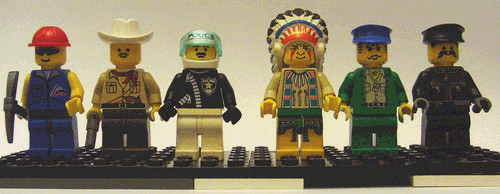

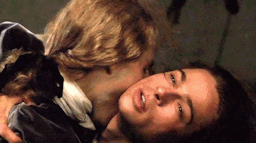
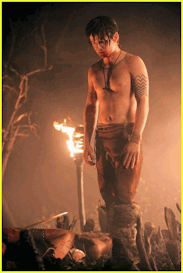
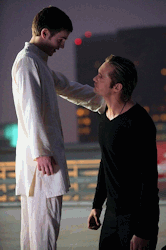
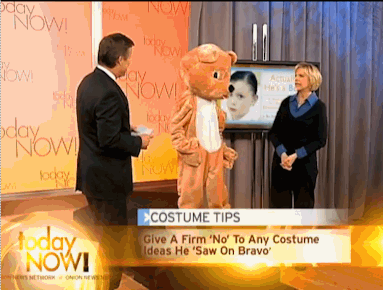

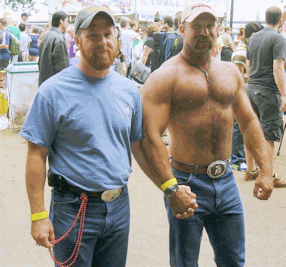
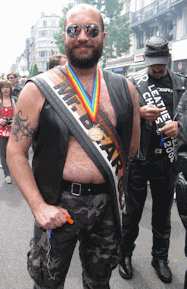
You ask whether the appeal to hypermasculinity is internalized heterosexism or plain old preference. That seems like a false distinction. If we really are socialized into heterosexism, then it’s made it’s way into our desires. Feminists talk a lot about this: how the male gaze becomes the way (straight) women see themselves and shapes their own sexual preferences.
This recalls the horror displayed by a family member of mine whose son was playing with lipstick at age 4 or 5. They didn’t scold him, but they were very careful to reinforce male images after that. Wife and I decided not to take that route after that with our girls…but I’ve no idea what route "should" be taken. Maybe Julia could offer up some learnin on her blog from the world of feminism, and you could bring in some queerism. Then I can can go check out me some James Dobsonism and decide. 🙂
BTW, my absolute favorite song as a very very unbelievably young child was macho macho man. Still is. I’m the cop.
Julia, regarding your last sentence, I’m curious. Is the feminist consensus on that (as if there was consistent agreement, but let’s say a majority) overwhelming negative, or do they see some sort of interrelatedness to that. In other words – do they see that as male imposition on their "true" self perception and preferences (ie true comes from vacuum) or do they see that as a reproductive and social benefit. As in a species whose individuals always have a interdependence even on subconscious levels?
That seems like a sociological or (perhaps) anthropological discussion, but it sure hints at evolutionary mechanism.
I know for a fact that my self-perception is at least somewhat influenced by what I think women see (or want them to see). That seems like a bad thing to say (hence my question) but it also seems like a good thing to have happen.
Chris, the way I was describing this follows the discussion of "the male gaze," described by feminist art critics like John Berger and by feminist film critics like Laura Mulvey. They (and other feminists) highlight that particular perspectives are given almost-total power and attention: in art and films the camera shot is taken from the vantage point of the male; the camera looks at the world through a male-identified lens. In turn, the perspectives that are internalized are always one-dimensional, heterosexist male. So, while you might consider "how does a woman see me?" you’re doing that in an imaginative way, while for women a single perspective of seeing themselves from a male vantage point has been made "natural." What they learn about themselves as sexual beings is about how others see them. What this means for Bryce’s question is interesting. How do these dynamics work when you’re not straight? I’ve read lesbians talking about the transgressive act of watching against the grain, but not gay theorists talking about it. In terms of evolution, reproduction, etc., just because something arose to promote procreation doesn’t mean it’s something that needs to be embraced and/or celebrated.
Hi Julia,
Thanks for clarifying, one more question
Can you give a couple of tangible examples of the naturalized male gaze of which they speak? Are they talking things like camera angles shot at a taller height than the average female (i.e. the perspective)? Or angles that give too much attention to…say…a woman’s chest (i.e. the subject/focus) or both?
Thanks muchly,
Chris